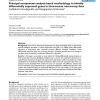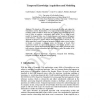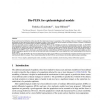101 search results - page 6 / 21 » Population Models of Temporal Differentiation |
BMCBI
2008
13 years 7 months ago
2008
Background: Time-course microarray experiments are being increasingly used to characterize dynamic biological processes. In these experiments, the goal is to identify genes differ...
AOSE
2005
Springer
14 years 1 months ago
2005
Springer
In order to create adaptive Agent Systems with abilities matching those of their biological counterparts, a natural approach is to incorporate classical conditioning mechanisms int...
EKAW
2010
Springer
13 years 5 months ago
2010
Springer
The objectives of this paper are to present, describe, and explain the foundations and the functionalities of a temporal knowledge acquisition and modeling solution workflow, which...
BMCBI
2007
13 years 7 months ago
2007
Background: This work explores the quantitative characteristics of the local transcriptional regulatory network based on the availability of time dependent gene expression data se...
ENTCS
2010
13 years 7 months ago
2010
Many models have been defined in order to describe the evolution of a disease in a population. The modelling of diseases is helpful to understand the mechanisms for their spread a...



